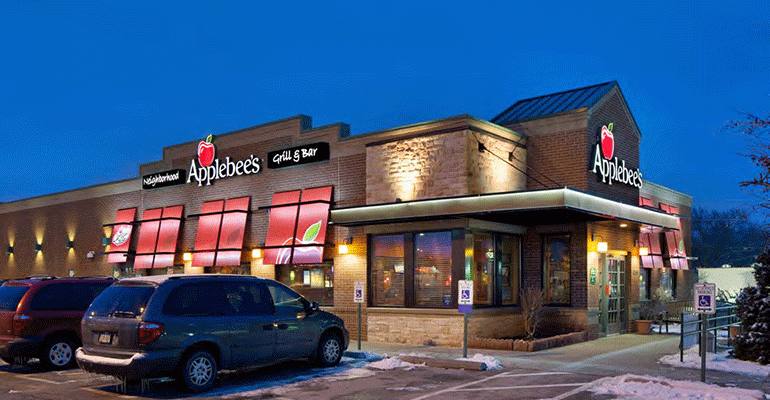The restaurant recession has cost the industry one of its most celebrated executives.
 Julia Stewart, who resigned on Friday as chairman and CEO of DineEquity Inc., made a major mark on the restaurant industry during her remarkably long, 16-year tenure.
Julia Stewart, who resigned on Friday as chairman and CEO of DineEquity Inc., made a major mark on the restaurant industry during her remarkably long, 16-year tenure.
Stewart was one of the earliest, most vocal proponents of the franchise-heavy, “asset-light” operating model that dominates the restaurant industry today. She was twice named a Nation’s Restaurant News Golden Chain award recipient, and in 2015 she was named NRN’s Operator of the Year.
But Stewart was ultimately undone by persistent, worsening struggles at Applebee’s, the casual-dining chain she engineered to acquire in 2007, when she was CEO of IHOP.
Applebee’s same-store sales dropped more than 5 percent in 2016, including a 7.2-percent decline in the fourth quarter.
Rather than fixing the problem, Applebee’s repeated efforts at a turnaround seemingly made things worse — particularly its wood-fired grill rebranding last year, which Stewart oversaw.
“When you lose confidence in the CEO, it’s hard to come back from that,” said Howard Penney, an analyst with Hedgeye Risk Management.
Stewart, who worked as an IHOP waitress as a teenager, was in marketing when a chance meeting with Carl’s Jr. founder Carl Karcher brought her to the restaurant industry. She ended up at Applebee’s, and was an executive there during the late 1990s.
In 2001, Stewart jumped to IHOP, and became its first female CEO in 2002. On her watch, the family-dining chain started selling off restaurants to franchisees in a move known as refranchising.
The plan worked. Between 2003 and 2005, IHOP’s net income increased 19 percent, even though revenue over the same period declined 14 percent, because the company didn’t operate as many locations.
Two years later, Stewart oversaw the acquisition of Applebee’s in a $2.1 billion deal, with the same goal of refranchising. The recession interrupted the effort, but the company completed the refranchising by 2014.
Investors flocked to DineEquity’s stock, which increased from about $20 per share in 2012 to more than $110 per share by February 2015. Other chains have worked to mimic the strategy, sometimes pushed by activist investors who cite DineEquity’s success through franchising as a model.
But mounting sales and traffic problems at Applebee’s have taken their toll on the stock, which has lost 45 percent of its value since peaking at $110 per share. That includes a 10-percent decline on Friday.
Same-store sales turned south in the third quarter of 2015, and they have steadily worsened ever since. By the third quarter, same-store sales had fallen 5.2 percent, or 5.7 percent on a two-year, stacked basis.
Then they cratered in the fourth quarter, falling 7.2 percent. On a two-year basis, the chain’s same-store sales were down 9.7 percent.
Stewart’s tenure at DineEquity has been more than twice as long as the average tenure of the CEO of a public company, which is 7.4 years, according to a 2014 study by the research firm Equilar.
Stewart also served as Applebee’s interim president. Mike Archer, who had overseen the brand since 2008, left in 2014. Steven Layt, his replacement, left in 2015, after DineEquity consolidated its operations in California.
Operators have grown increasingly stressed about Applebee’s performance, and privately questioned the company’s direction.
Last May, Applebee’s revealed a major brand transformation, using hand-cut steaks and wood-fired grills in a bid to differentiate itself in a difficult casual-dining market. Operators spent millions of dollars to install grills in their restaurants that use oak wood to give the chain’s offerings a smoky flavor.
But the effort failed. Same-store sales in the quarter fell 4.2 percent and have worsened ever since.
Applebee’s spent an estimated $75 million on the effort, most of it by franchisees who bought new grills and trained workers on how to cut the steaks and use the equipment.
“That just sewed her fate,” Penney said.
Throughout this decline, IHOP had remained steady. But it, too, saw same-store sales fall in the fourth quarter, by 2 percent.
DineEquity now faces a major challenge in trying to fix its problems.
“The challenges remain large, and likely won’t be fixed easily or quickly, particularly at Applebee’s,” Instinet analyst Mark Kalinowski wrote in a note on Friday.
Brian Vaccaro, analyst at Raymond James, downgraded DineEquity’s stock on the news, noting that Stewart’s departure “creates incremental uncertainty regarding the path and timing of a potential turnaround at Applebee’s.”
In his own presentation on DineEquity back in December, Penney speculated that cost demands like wood-fired grills and the company’s weak same-store sales have squeezed Applebee’s operators.
As such, the company might need to invest in the business, but DineEquity pays out most of its earnings to shareholders in the form of dividends, and might not have the financial wherewithal to make those investments.
“They’ve got a real problem on their hands,” Penney said. “What if some of these guys running down 10- to 12-percent comps really need help? What if they have to start giving concessions? They’re really screwed.”
Contact Jonathan Maze at [email protected]
Follow him on Twitter: @jonathanmaze





